Fossett's Roadshow & Circus
Contributed by; Patrick Long
Edward Fossett, (c.1895–1951), horseman and circus owner, was born near London, son of Sir Robert Fossett, originally of Islington, and Mary Fossett (née Francis), a bareback rider from Co. Wexford who performed as ‘Miss Mini’ in the family business, Sir Robert Fossett's Circus. Of their eleven children, nine (including Edward) entered the circus. Daring and physically strong, he trained as a bareback rider and moved to Ireland in 1917. Initially he joined Powell and Clarke's Circus, established since 1888 by George Lowe, a charismatic Corkman from Mallow who adopted the title ‘William [or ‘Doctor'] Powell’ and performed in his own shows as a sword-swallowing ventriloquist and juggler. Having learned his acts in America, and performed both for Barnum's and for William Cody in Buffalo Bill's Wild West Exhibition, ‘Doc’ Powell was the ideal mentor for Fossett, whose riding and training skills he encouraged. In 1922 Fossett married Powell's daughter Mona, a fellow horse trainer and artiste who also had a sound knowledge of the business. They had six children (Robert, Mary, Edward, John, Amy, and Mona), of whom the sons would become directors of the business that bore their name.
Edward took charge of the circus in the 1920s, renaming it ‘Fossett's’, a title which he grandly changed to ‘Heckenberg's Berlin Tower Circus’ in 1933, to stand out against rivals such as Duffy's and Courtney's circuses. The annual touring season (spring to November) determined the pattern of family life, reflected in the diversity of the children's birthplaces, school experience, and duties in the circus from an early age. Edward Fossett had set up home at Ballybeg House, Ballinglen, Tinahely, Co. Wicklow by the late 1930s, his farm and winter quarters when not on tour. As the advent of war in Europe made the Heckenberg title an object of suspicion, especially in Northern Ireland, where it was greeted with outright hostility, he reverted to the business name ‘Edward Fossett's Circus Cavalcade’, prompting retention of the family name in subsequent alterations.
Edward Fossett's yearly Easter-to-November schedule was limited by wartime restrictions on travel, international acts, and the demands of compulsory tillage at Ballinglen during the Emergency (1939–45). His wife died after surgery in June 1946, just as postwar touring had resumed. Now his sons, Robert (‘Bobby’), Edward (‘Teddy’) and John (‘Johnnie’, b. 23 January 1931, who performed in and administrated the circus, d. 1 June 1989) became his support on tour. They succeeded as directors when he died 6 September 1951 of lung cancer at the Mater private nursing home in Dublin. He was buried at Glenmore cemetery, Co. Waterford. Fossett's renowned stamina, openness, and readiness to undertake any task, from tent-building and animal care to performance, business management, and the frequent recapture of escaped lions, set the standard followed by his sons, of whom two in particular became household names.
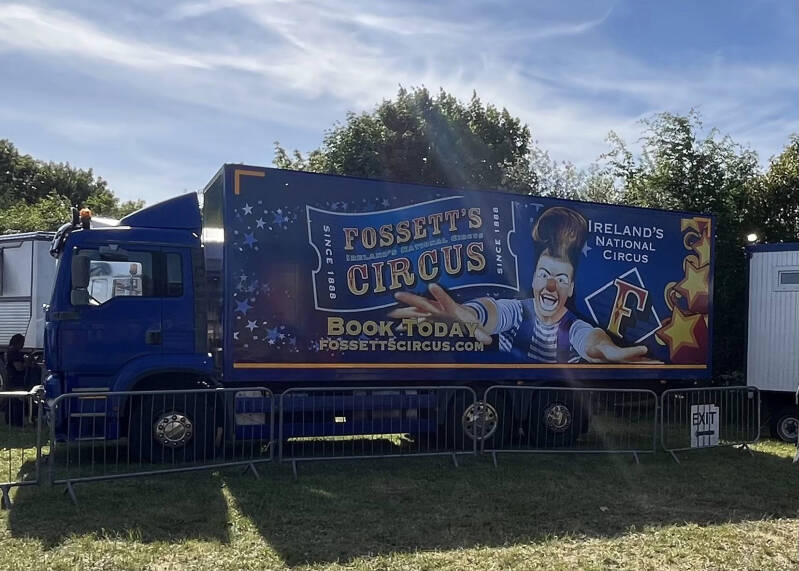
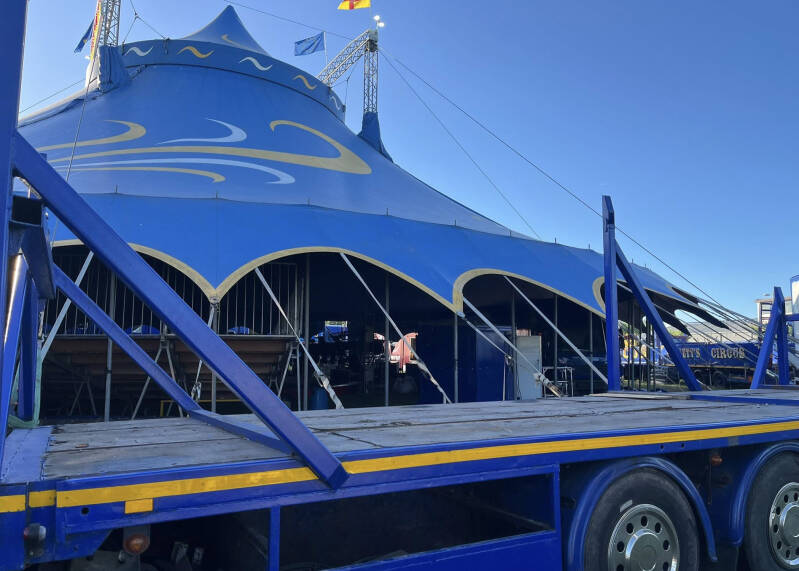
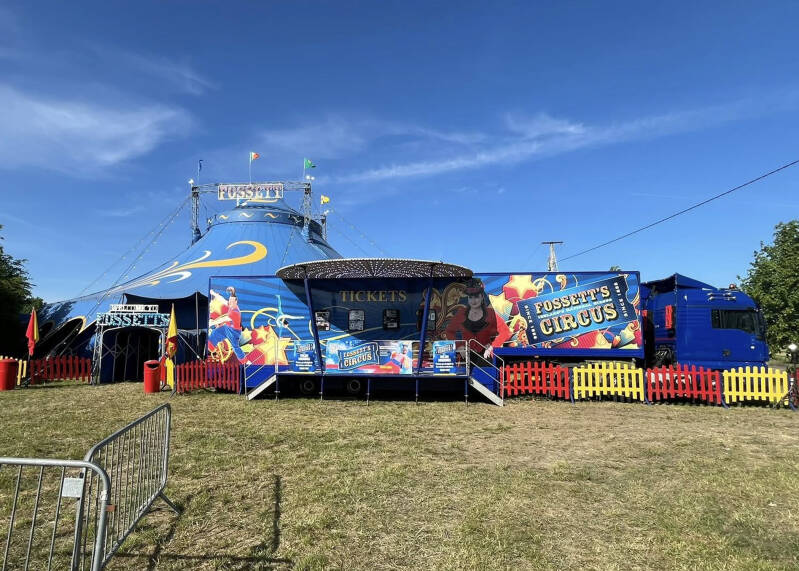
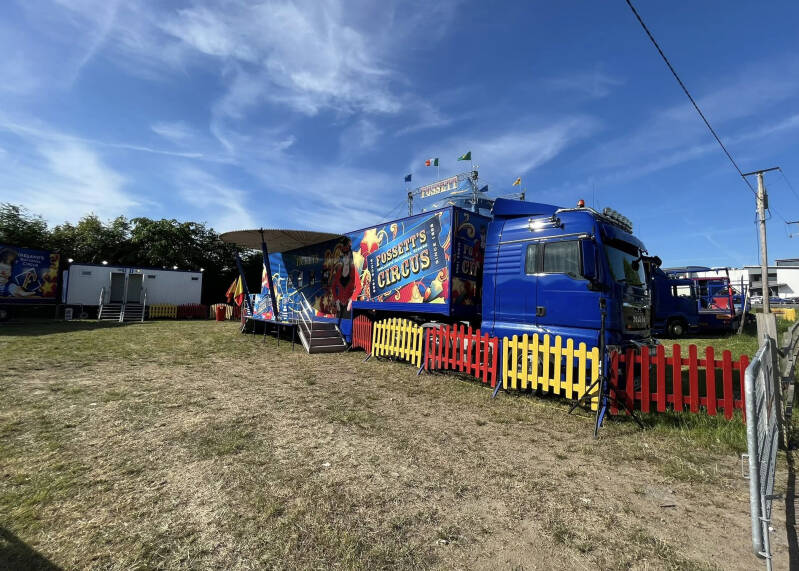


Robert (‘Bobby’) Fossett (1924–2002) was born 11 January 1924 at Knocklong, Co. Limerick, eldest son of Edward and Mona Fossett. He was educated at Tinahely national school and toured with the family circus from childhood. As a 6-year-old he was badly mauled by a bear. Performing from the age of 10, he took part in various acts, including tightrope walking, bareback riding, and comedy, increasing his versatility with the absence of foreign acts in the restrictive Emergency years after 1939. At that time, ‘Bobby’ Fossett also assisted his father on the farm at Tinahely and in the winter toured a fit-up cinema show. By 1946, while overcoming his mother's death, he became fully involved with the revived touring circus, adding the role of transport manager to his responsibilities. On their father's death in 1951, Bobby and his brothers inherited the business between them, as he now became programme director. Three years later they sold the property at Tinahely and established permanent winter quarters at the Grange, Lucan, Co. Dublin.
Bobby Fossett was both artistic and a gifted mechanic, using his practical skills to good advantage in the numerous expensive emergencies that affected a travelling roadshow. He also built a clown car, his ‘crazy taxi’, the famous prop of his signature performance as Bobo the Clown. Since the 1940s he had perfected a dangerous high-wire comedy act, which featured in his British guest appearances with the Moss, Robert, Billy Smart, and Royal Hippodrome circuses. In Belfast he played the Grove Theatre. He was frequently on film and television from the 1960s and became associated with popular events such as the Rose of Tralee festival. His late marriage to Susan Delaney from Co. Kilkenny was short-lived, as she died in 1987, after which Bobby Fossett gave up performing. He remained closely involved in administration and the promotion of new talent, but failing health eventually forced him to retire. When he died 18 July 2002 at Dublin's Tallaght hospital, he too was buried at Glenmore, last of the brothers, both Edward and John having predeceased him.
The second son, Edward (‘Teddy’) Fossett (1927–98) was born 17 November 1927 in Augher, Co. Tyrone. Known throughout his life as ‘Teddy’, he was educated at New Ross CBS and joined the circus immediately afterwards. It consumed his life, as animal trainer, presenter, director, and joint owner with his brothers from 1951. For thirty-seven years Teddy Fossett was the elegant and quintessential ringmaster. By extension, he was the administrative face of Fossett's Circus, was greatly interested in the wider entertainment industry, and campaigned to elevate the professional status of circus as a recognised art form. He was chairman for ten years of the Irish Showman's Guild and, through his circus shows, was a lifelong contributor to the Lions Club, receiving its Melvin Jones fellowship (1993–4). In 1953 he married Czech circus artiste Herta Pohorsky, daughter of Otto Pohorsky (known as ‘Otto Lord’, animal trainer) of Prague and his wife Elsa Himmelman. They had five children (Marion, Edward, Angela, Mona, and Robert), the next generation to take control of the business.
Teddy Fossett was an expert carpenter and built his own show wagons, the practical alternative to costly construction by contractors. He toured tirelessly with the circus throughout Ireland, ‘knowing no borders’, proud of Fossett's continued popularity and of its being the largest circus on the island. To the end of his life he was outspoken in defence of circuses against opposition from environmentalists and animal-rights activists. Although the circus was his life, Teddy Fossett reserved some spare time for his interest in Irish history. He died 11 January 1998 of lung cancer at Peamount Hospital, Newcastle, Co. Dublin, and was buried in Lucan. His sons Edward and Robert inherited the business, his eldest daughter Marion becoming ringmaster after a career in music. As proprietors of Fossett's National Circus, Teddy's sons took their own children into the business and in 2002, the year of their uncle Bobby's death, marked the 114th year of their corporate existence with the stated aim of lasting for 114 more.
Sources
Ir. Times, Ir. Independent, Ir. Press, 8 Sept. 1951; Albert B. Daniels, ‘Five and nine’: recollections of the touring shows of Ireland (1991); Ir. Times, 13 Jan. 1998; Sunday Independent, 18 Jan. 1998; Ir. Times, 3, 6 Aug. 2002; information from Ms Marion Fossett, daughter of Edward (‘Teddy’) Fossett
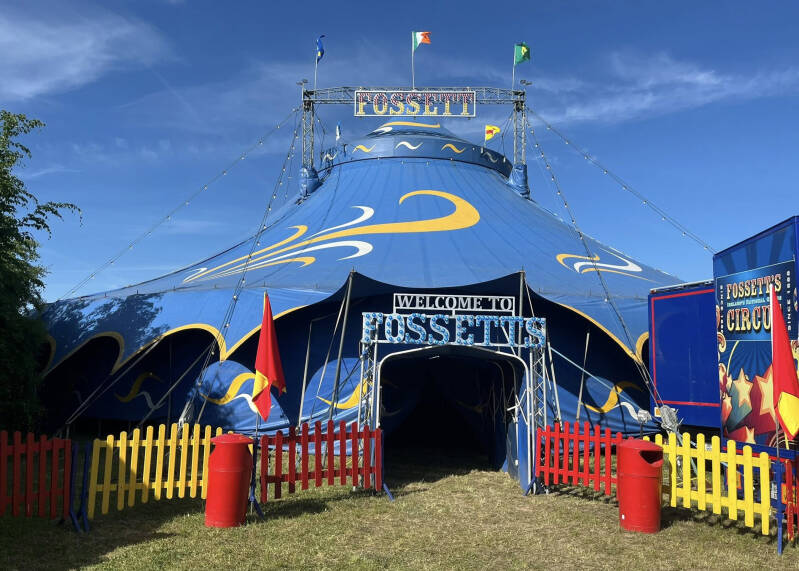


Members of the original Fossett's Brothers Circus
Life in the Circus - the story of Mary Garcia (nee Fossett)
Story as told by Mary Garcia (nee Fossett)
A family visit to the big top — to witness fearless aerial stunts, awesome acrobatics and all the drama and intrigue a curly-moustached master can conjure up in the ring — has been a favoured pastime in nations across Europe and further afield for centuries. But little is known, or possibly even thought about, of the families and vast workforces that keep these theatres of fun and exhilaration working come wind, rain or snow. Yet there are tales as intriguing as the performances played out on the centre stage in the lives and losses of the men and women of the circus tradition, which are subtly etched on the many generations of family that have come through it.
Circuses that have stood the longest have survived world wars and civil wars to continue to bring pleasure to the masses with the unexpected, unusual and unexplainable. But for the performers the unique way of life can boast as much personal tragedy as it does excitement, exoticism and playing up to the audience. For Mary Garcia (nee Fossett) it is the only life she has ever known and — while she has experienced many highs and lows over the years — she wouldn’t have it any other way. Now based in Birmingham, the 88-year-old was born into Ireland’s much-loved Fossett’s Circus in Dublin in 1926. In the years that have passed she has been famed as a child performer, travelled the world with the circus and raised seven children of her own, who all went into the family business. But in contrast to the excitement that comes with such a life, Mary’s family has also been struck by a series of serious and fatal accidents over the years.
In 2003 her 38-year-old daughter Eva, a well-respected aerial artist, fell more than 20 feet to her death in front of a crowd of 800 people during a performance at the historic Hippodrome Circus in Great Yarmouth, Norfolk. Years earlier her eldest son Tony was left paralysed in a road accident in South Africa while the circus moved between sites. Youngest daughter Mariska was also previously injured in action, breaking her back at the age of 21. At the time doctors called on Mary to switch off her life support machine, but she refused, thankfully, and Mariska made a full recovery. More recently, in 2006, her daughter Maria’s husband, French aerial artist Gilles Antares, was killed following a horrific fall from a trapeze. “It’s very difficult to deal with the heartaches,” Mary told The Irish Post. “You think about your family and those you have lost every day.” Her widowed daughter Maria, who lives close to her mother in Birmingham, added: “Our family has suffered a lot of pain and devastation over the years, and we will never get over our loss. “But the reality is there is a lot of tragedy with the circus,” the mother-of-two explains. “That’s what comes with being on the road. Sometimes its sunshine, sometimes it’s snowing. That’s all part of the life. I am sure a lot do people in show business will relate to that.” She added: “We have been heartbroken again and again, but it never stopped our work — you ask a pilot or anyone doing dangerous work to stop and they don’t. They just keep doing it.”
For Mary and her large family, who all continue to work in the industry, the tragedies are part and parcel of a lifestyle that has been “in their blood” for five generations. Mary’s father Edward Fossett came from a circus family renowned for their horseback riding skills who ran shows across England. He moved to Ireland during the First World War, where he began working for an acclaimed ventriloquist named Dr Powell on a touring variety show. After falling for his daughter Mona, the pair soon wed. Once married, Edward encouraged his father-in-law to launch his own Irish circus, which he did, with a German theme. But when World War Two began its name was changed to the Fossett Brothers Circus, which would later become Fossett’s Circus.] Listening to Mary, one of six children born to Edward and Mona, who all joined the family business, life within the original Fossett family was an exciting but hard-working affair. “I enjoyed being part of the circus, we didn’t know any different,” she told us when we visited her home in Birmingham.
“I loved my life growing up, we travelled every day to a new town across Ireland to set up the circus. There would be two performances each day then everything would be broken down and we would be on the road again in the middle of the night.” She added: “Life was hard really. We all worked hard, we travelled, we drove the horses from town to town, but we had fun too and there were always lots of animals. I had Jericho my pet monkey, my mother had a pet sea lion and we had lots of dogs, 150 horses, three elephants and lions.” Mary, who officially began performing in her parents’ circus at the age of 14, first learnt the art of trapeze before being trained in bareback horse riding. “We trained while we were travelling,” she explains, “and I wasn’t afraid to learn. I learnt the trapeze and then I learnt how to train the horses. It was bareback riding. I would perform, do voltage, jumping up and down, do pyramids, things like that, all on the back of the horse. I would skip on the horse also, but it just felt natural. All of my father’s sisters were bareback riders.” While Mary claims the family “didn’t know” what a holiday was, over Christmas the Fossetts would spend some time in their winter quarters. Originally this was located in the vast grounds of Ballybeg House, nestled within a forest in Co. Wicklow — which is now a popular wedding venue.
Later they moved their quarters to a secluded spot in Lucan, just outside of Dublin. Seclusion was key for the touring circus family — who were large enough in number themselves, but also had to accommodate a raft of labour staff, artists, an eye-watering selection of exotic animals and all of their equipment when not on the road. “We spent some time in winter quarters over Christmas, between doing some work in picture shows and variety shows and taking part in a show at the Belfast Hippodrome every year,” Mary explained. “We never knew what a holiday was,” she adds, “as soon as we stopped a season we would start getting ready for the next one.”
When Edward and Mona Fossett both passed away at young ages, within years of one another, their six children were forced to work extra hard to keep the circus going. They ensured that the big top went up — come rain or shine — every day that passed, even when they didn’t have enough cash to feed themselves, and eventually came through the toughest of times as strong and successful as they ever were. And they all found love along the way — marrying and soon bringing a new generation of circus family into their tradition. As Mary matured on the road she too found love in the circus, in the form of a Spanish juggler who was one of their many European artists. Contracted to join the Fossett family for a summer season, Antonio Garcia and his brother Luis were renowned performers who had wowed crowds in Paris’ Moulin Rouge before making their way to Ireland.
Antonio and Mary began courting and were soon married under the Fossett’s Big Top in Ballyfermot, Dublin (Luis also later married Mary’s sister Amy). The pair went on to have seven children of their own. As the Fossett siblings moved away from their original circus home, to raise families and pursue their trade in other countries, Mary and Antonio found their own children, Tony, Maria, twins Carmel and Mona, Pablo, Eva and Mariska, were keen to pursue a career in the circus as The Garcia Troupe. And while unthinkable tragedy has struck them along the way, the family continues to work in circus and variety acts across the world. “We were all brought up in the circus so we loved it from a very early age,” Maria said. “You are learning from when you are about three really. I always enjoyed it, but I remember watching my uncles and they worked so hard. “They were up every day at 6am driving through to the next town, putting up these canvas tents and the conditions in Ireland were terrible for it. “I’d see them every day bracing whatever weather was thrown at them to get the circus up and running. I always remember feeling so much sadness for them. They were always knee high in mud.” She added: “Eventually all the Fossett brothers had wives and children and it became a very big family. A lot of my cousins stayed home with their grandmothers and were educated, but we stayed with the circus and we worked in the shows. “It’s in you I think, even in my children now. We have settled down in Birmingham so they can get an education but we do the odd shows. They just love it. That’s what they want to be doing. It’s in their blood.”
Each of the Garcia siblings continues to work in the industry in some way, Maria explains, and most now do this with their own children. Three of Mary’s grandchildren are currently completing their first performing season without their parents, on a six-month contract with an “epic Norwegian cruise ship”. Another three are performing in Las Vegas, while others are working with their parents on shows scattered across Europe. “Our lives today are a huge legacy from Fossett’s Circus, where we grew up,” Maria claims. “All my cousins have stayed in the business with their families. Really everybody went into show business. “But even though we are so scattered we are still a very close family. Living the life of a touring circus means you can set up home anywhere quite easily, but really home is when the family is all together.”
Despite much time passing these days between opportunities to get everyone together, the Garcia children are clear that they too wouldn’t have their lives any other way. “I wouldn’t change a thing about our life,” said Maria. “There were so many highlights over the years, each country we visited has its own culture and I loved to explore that, and we got a fantastic education on the world. “Life was like one continuous adventure, so the whole thing is a highlight. We saw some fantastic places and there were so many beautiful parts of the journey.”
Fossett's is part of the fibre of Ireland




Marrion Fossett, ringmaster of Fossetts Circus. Photo: Daragh McSweeney
By Paul O'DonoghueApril 6th 2016
Co-owner Robert Fossett already thinks that it is very likely that his children, aged 10 and 11, will take over the reins of the institution when it is time for him to pass it on. “Some people might ask me from a perspective of, why would you do that to your children,” he says. “Sometimes when you’re contemplating life that’s a question you ask yourself, but at the same time part of my children’s DNA is that they’re Fossetts. “I don’t mean to sound pretentious, but unless you’re on the road with us and you tour the country and you see the place that we have in people’s hearts, it’s very difficult for you to understand.”
Fossetts, jointly owned by brothers Robert and Edward, is Ireland’s most famous circus. One of Ireland’s oldest companies, the 128-year-old firm went into the examinership restructuring process last year amid mounting debts. After its creditors took a hefty write-down, the show is back on the road. Fossett’s has been doing the same thing for the last 128 years: try to entertain and dazzle the public by putting on the best show it possibly can. After moving away from animal acts at the turn of the decade, Fossett’s focuses more on human performance such as clowns, acrobats and trapeze acts. The company was started by Corkman George Lowe, who toured the US with famed showman William Cody aka ‘Buffalo Bill’, before he returned to Ireland and set up his own circus troupe. Accomplished horse rider Edward Fossett joined in 1918, falling in love with and marrying Lowe’s daughter, Mona. The couple had six children who followed them into show business and established Edward Fossett and Sons Circus, which has been passed down through the family since. Fossett’s has gone through hard times in recent decades. A dispute between the extended family led to legal action that started in 1992 and was not resolved until 2008, leaving a settlement bill of €500,000.
The company went into examinership in October 2014 following the battle and a dispute with Revenue over unpaid VAT. After securing a write down of almost €180,000 from its creditors bringing accumulated losses down to just under €14,000, Fossett’s came out the other side of the process and brothers Robert and Edward are now looking to steady the ship. Brothers and co-owners Edward Fossett (upper left) and Robert Fossett (upper centre) with mother Herta and Edward Fossett junior. Fossett’s is pretty low margin. The company takes in about €800,000 a year through through a mix of entry charges at its shows and retail sales, such as the the money made from selling soft drinks. It’s about a 50-50 split between the two, a dramatic change from several decades ago where ticket sales made up about 85% of sales.
“We’ve had to focus more on retail as part of the business,” says Robert Fossett. As part of this the company offers offers several different levels of discounts through websites and community outlets, such as local rugby clubs, to help drive spending. However, the circus spends almost exactly as much as it takes in. “If we were registered in other countries, we could register as a non-profit,” he says. Like most companies, Fossett’s biggest cost is its staff. The company employs about 40 people between performance artists and backroom workers. The other major cost is transport. Fossett’s travels all over the country, often moving from one end of the country to the other, which Fossett says leads to costs quickly stacking up. “On one hand we’re running a transport company, if you want to look at it like that,” he says. “Fuel is the other big one. In July, we’ll spend about €1,100 a week on generator fuel, when we open our doors in Christmas time that cost will have trebled, it’s as simple as that.” Fossett’s is tied to the Irish market. The circus is Ireland’s oldest and most famous, travelling the length and breadth of the country multiple times every year in an attempt to be seen by as many people as possible.
Fossett looks shocked when the possibility of expanding abroad is even mentioned. “Circuses don’t leave their own country normally, it’s very, very rare,” he says. “And it’s not really what we’re about, our ethos is about the legacy of what we provide year after year as a national circus. “(It’s like) a familiar entity that gives you a different show, almost like a different edition every year.” The company has also looked to move into the corporate market, performing at shows and festivals such as Electric Picnic in recent years. “(The corporate events) are coming along nicely, there’s a security about it and it also helps spread the brand,” he says. “It’s a side of the business that’s really been cultivated in the last few years and really has the edge on competitors.”
There are a small number of other circuses who have made Ireland their base, such as Circus Gerbola and Tom Duffy’s circus, however Fossett says that they are not the main concern for the firm. “Reputable circuses go about their business and sort of keep away from each other,” he says. “Even if they are close it’s ok. My father had a saying; ‘You can follow a good show, but you can’t follow a bad show. The problem is that if you have a particular spurious type then they may look to jump in front of you and that can be problematic and then people aren’t going to come (to the circus).” More problematic for the circus is other events or one-off days that clash with a Fossett’s performance. “Everything can affect our business. A local team winning a match and playing an away match can kill our business, Mother’s Day can kill our business, some local event can kill our business,” he says.
Although it had large debts before the examinership, Fossett thinks that the company’s position has stabilised after coming out the other side. With much of its debt gone, for Ireland’s oldest circus it’s now a case of slow and steady; there will be no exponential growth as the Irish market is already largely tapped, no rapid expansion abroad. That’s just fine by Fossett. “I would like to think that we can get to €900,000 turnover revenue over the next couple of years,” he says, as the company hopes to grow from corporate gigs and by targeting more performances during holidays such as Christmas. However, according to Fossett the bottom line is not the focus for the circus, as long as it makes enough to keep things running smoothly. “We just try and get the costs covered and keep everything in play,” he says. “We don’t work for profit.” More important for Fossett is to keep promoting the family brand, with the goal of ensuring that it is identified as Ireland’s ‘national’ circus.
“We’re part of the fibre of Ireland and that’s where our loyalty is. It’s not about my brother and I making money to buy a big house,” he says. “We are just the current caretakers of Fossett’s. We need to keep it steady, so that it’s still there to hand onto the next caretaker.”
Marion Fossett - Ringmaster
I was born in a suitcase in a sense because we were always travelling': Marion Fossett, ringmaster of the famous circus, is the seventh generation of her family to wow crowds across the country.
She and her mother Herta shared their extraordinary life stories, from Herta's last-minute escape from Czechoslovakia as a teenager after World War 2, through to travelling around as one of Ireland's biggest circus families. Then Marion had her own showbiz career, including a tour with Emmylou Harris, representing Ireland at the Eurovision and TV presenting on RTÉ.
But it's the circus that always draws her back. 'The circus life is a wonderful one,” she says. 'I was shy as a kid. Then I became who I am, I think. I think I’ve always been a bit of a diva. My job is a mixture of compere and stage manager. I’m a very old-fashioned, traditional ringmaster. I do it the classic way'




